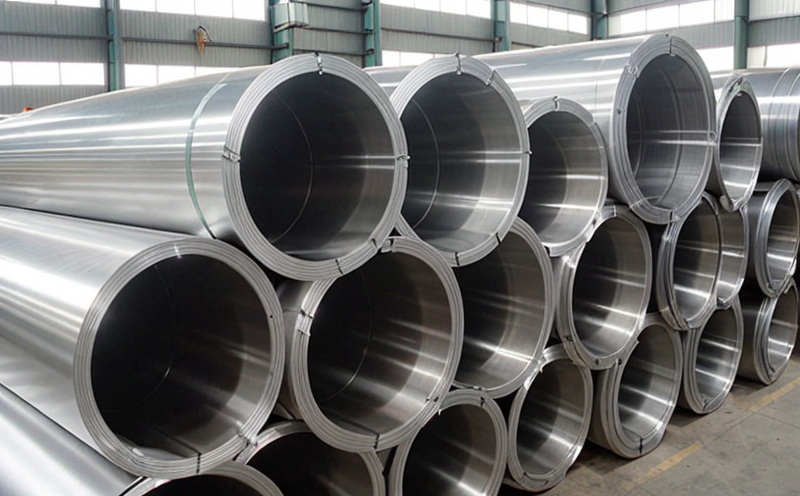ISO 7141 High Altitude Pressure Testing for Marine Components
The ISO 7141 standard specifies a method for determining the resistance to high altitude pressure of materials used in marine components. This testing is critical for ensuring that marine equipment can withstand the extreme conditions found at altitudes where aircraft and other high-altitude vessels operate.
High altitude pressure environments pose unique challenges, particularly for materials like aluminium, which are commonly used in marine applications due to their strength-to-weight ratio and corrosion resistance. Aluminium components must be able to perform reliably under low-pressure conditions that can occur at high altitudes. The ISO 7141 test simulates these conditions by applying controlled pressure to the material samples.
The testing process involves several key steps:
- Sample preparation: Specimens are cut from the marine component or a representative sample of the material used in its construction.
- Pressure application: The prepared specimens are subjected to high-altitude atmospheric pressures, typically ranging between 20 and 85 kPa. This simulates the pressure conditions found at altitudes above sea level up to approximately 11,000 meters (36,000 feet).
- Observation: During the test, engineers observe any changes in the material’s physical properties or structural integrity.
- Data analysis: After the test is completed, detailed data on the material’s performance under pressure are analyzed. This includes measurements of strength loss and any signs of deformation or cracking.
The results of this testing are crucial for ensuring that marine components remain safe and functional in high-altitude environments. By identifying any weaknesses or vulnerabilities early in the design process, manufacturers can make necessary adjustments to their products before they enter service.
Aluminium materials, being a critical component of many marine systems, undergo stringent ISO 7141 testing. The properties of aluminium, such as its density and thermal conductivity, are particularly influenced by high-altitude pressure conditions. Understanding how these properties change under pressure allows manufacturers to optimize the design of their products for optimal performance.
The importance of this test cannot be overstated in the context of marine equipment. In environments where failures can lead to significant risks or costs, such as those encountered during aircraft operations, ensuring that materials used are reliable and safe is paramount.
Eurolab Advantages
At Eurolab, we pride ourselves on delivering high-quality testing services tailored to the needs of our clients. Here’s why you should choose us for your ISO 7141 high altitude pressure testing:
- Expertise and Experience: Our team consists of highly skilled engineers with extensive experience in marine engineering, materials science, and environmental testing.
- State-of-the-Art Equipment: We utilize the latest testing equipment to ensure accurate and reliable results. Our facilities are equipped with precision instruments capable of simulating high-altitude pressure conditions precisely.
- Comprehensive Reporting: Beyond just passing or failing, we provide detailed reports that offer insights into your material’s performance under specific test parameters. This information is invaluable for continuous improvement in design and manufacturing processes.
- Prompt Service: We understand the importance of timely delivery of results, especially when deadlines are tight. Our efficient processes ensure you receive your reports quickly without compromising on quality.
- Dedicated Support: From initial consultation to final report review, our dedicated team is always available to assist you with any questions or concerns.
With Eurolab, you can be confident that your materials will undergo rigorous testing that meets the highest standards. Our commitment to excellence ensures that every test conducted is not only accurate but also relevant and actionable for your specific application.
Quality and Reliability Assurance
At Eurolab, we take quality assurance very seriously. Our ISO 7141 high altitude pressure testing service is designed to provide you with the confidence that your materials will perform reliably under extreme conditions. Here’s how we ensure this:
- Standard Compliance: All our tests are conducted in strict adherence to international standards, including ISO 7141 and ASTM E586.
- Quality Control: Each test is closely monitored by our quality control team to ensure that all procedures are followed correctly. Any deviations from the standard protocol are immediately identified and addressed.
- Consistency: We use consistent testing conditions across all samples to ensure that results are comparable and reproducible. This consistency is crucial for maintaining high standards of reliability and accuracy.
We also offer post-test analysis services, where our experts can help you interpret the data obtained from the tests. This service ensures that you not only have the raw data but also a clear understanding of its implications for your product development or quality assurance processes.
By choosing Eurolab for your ISO 7141 testing needs, you are investing in a service provider who is committed to excellence and reliability. We believe that every test conducted should contribute towards improving the quality and performance of materials used in critical applications like marine equipment.
Environmental and Sustainability Contributions
The ISO 7141 high altitude pressure testing for aluminium materials plays a significant role in promoting environmental sustainability. By ensuring that materials are capable of withstanding harsh conditions, we contribute to reducing the frequency of failures which can lead to increased resource consumption.
- Reduction in Repairs: Reliable materials reduce the need for frequent repairs and replacements, thereby minimizing waste and the environmental impact associated with manufacturing new components.
- Economic Efficiency: By ensuring that marine equipment remains operational under extreme conditions, we help to extend the lifespan of these assets. This leads to increased economic efficiency and reduced emissions from unnecessary production cycles.
- Innovation in Design: The insights gained from ISO 7141 testing can drive innovation in materials science, leading to the development of more sustainable and efficient products.
These environmental contributions are just one aspect of Eurolab’s commitment to sustainability. We strive to provide services that not only meet current regulatory requirements but also contribute positively to future environmental challenges.





